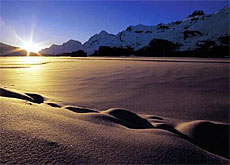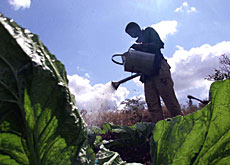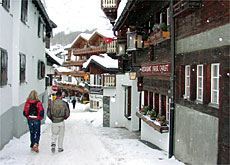Parliament stalls over Alpine Convention

The Senate has delayed a decision on whether to ratify the protocols to the Alpine Convention.
Tuesday’s postponement is a further blow for supporters, who maintain the convention provides a framework for the protection and sustainable development of the Alps.
The Senate said it needed more time to debate the convention’s protocols and has referred them back to its commission.
The protocols to the convention, originally signed in 1991, cover a number of policy areas including land management, tourism, energy and transport.
“The spirit of the convention is development, combining environmental and economic aspects,” Pierre-Alain Rumley, director of the Federal Office for Spatial Development, told swissinfo.
“It gives a perspective to development [throughout the Alps] and without such a perspective there would be a lot of projects but far less unity in their growth.”
No benefits
But the Swiss Business Federation – economiesuisse – insists that while a refusal to accept the protocols could be interpreted as “going against the spirit” of the convention, their ratification would not bring Swiss communities any concrete advantages.
“In our view it’s very important for Alpine cantons to develop their own policy,” René Buholzer of economiesuisse told swissinfo. “It should not be dictated by international law or bureaucrats in Bern.
“Nobody is arguing that we don’t do anything for sustainable development of the protection of the environment [in the Alps] – on the contrary many maintain we do a lot.
“So the question remains whether Switzerland would gain anything from ratifying the protocols.”
Loss of power
The Senate commission has already echoed the fears of economiesuisse, asserting that Switzerland would no longer have a legal say over development policy in Swiss Alpine communities if it ratified the protocols.
The commission has recommended the Senate reject ratification of the protocols.
Economiesuisse’s Buholzer claims that a coordinated developmental policy for the Alps will depend much more on what the European Union has to say than the policy outlines, or protocols, of the convention.
“If there are going to be concrete decisions on traffic, tourism or energy, EU directives will have much more impact and will be more important for the development of the Alpine region,” he said.
“It’s also not clear at the moment how far some of the protocols would go,” he added.
“For example there has been no clear agreement of how much of a tourist infrastructure would be allowed under the terms of the protocol.
“We want this sort of decision to take place at a local rather than an international level.”
Influence
Rumley dismisses fears that Alpine communities in Switzerland would no longer be able to influence policy areas at a local level.
He says more than 70 communities have already benefited from the impetus the convention has given them to develop projects.
Those schemes, he says, might never have come to fruition without the framework of support at a both an international and local level.
“The convention and its protocols give small communities the chance to have a meaningful exchange [of information and experiences] with similar communities in other countries,” he said.
“If Switzerland fails to ratify [the protocols] it will be the only country to reject them outright.”
Lengthy delay
The Alpine Convention was signed in 1991, but it was not until eight years later that it came into force in Switzerland.
Its aim is to formulate a common and comprehensive policy among Alpine countries on the protection and sustainable development of the Alps.
Apart from Switzerland, the other signatories to the convention are Austria, France, Germany, Italy, Liechtenstein, Monaco, Slovenia and the European Union
Over the years the policy areas of the convention have been broken down into a number of protocols, such as land management, tourism, soil protection, energy and transport.
Although Switzerland has signed several of the protocols, it has so far refused to ratify them.
swissinfo, Jonathan Summerton.
The Alpine Convention was signed in Salzburg, Austria in 1991.
It first came into effect in Switzerland 1999.
Since its inception, the convention has been supplemented by a number of protocols covering policy in land use planning, mountain forests, protection of nature and landscape, tourism, soil protection, energy and transport.
In November 2002, the Austrian town of Innsbruck was chosen as the permanent headquarters for the Alpine Convention.

In compliance with the JTI standards
More: SWI swissinfo.ch certified by the Journalism Trust Initiative


You can find an overview of ongoing debates with our journalists here. Please join us!
If you want to start a conversation about a topic raised in this article or want to report factual errors, email us at english@swissinfo.ch.